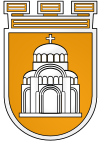 Alternate names: Pleven and Плевен [Bulg], Plevna [Rom], Plevne [Turk], Plewen [Ger]. 43°25' N, 24°37' E, in N Bulgaria, 83 miles NE of Sofiya.
Alternate names: Pleven and Плевен [Bulg], Plevna [Rom], Plevne [Turk], Plewen [Ger]. 43°25' N, 24°37' E, in N Bulgaria, 83 miles NE of Sofiya.
Wikipedia. [Sept 2014]
CEMETERY:
-
Radishevsko chose: The small, still active Pleven Jewish community [about 70 people in 2000] cemetery dates from the end of the 19th century. A path between the residential district called Druzhba to the road to the village of Radishevo crosses the cemetery and serves also as a shortcut to the center of the town. The abysmal condition of the cemetery includes a pre-burial house, burnt to the ground and plundered with only the foundation remaining. The guard cabin was destroyed. No security and no institution care for the cemetery exists, not even notation on the local map. Many gravestones were damaged, overturned, or buried in vegetation. The municipality proposed appropriating half of the plot for other uses. A new plan for the land division, on which the present Jewish cemetery is marked, shows the area of existing burials with the remaining part marked as a reserve of the municipality. In practice, this gives the municipality the right to seize the land and use or sell it. Because Pleven's archives have been destroyed, no inventory refers to the exact boundaries of the cemetery. A cemetery plot of 11,000 square meters is mentioned in a 1942 document that contains an inventory of the Jewish property in accordance with the Law for Protection of the State. Although this supports the community's claim to the land, the local Jewish community has been unable to prove property rights because its archives also were lost. Sections of this portion of the cemetery already were appropriated by the municipality over the protests of the Jewish organizations for a new block of apartments and for construction of an electric power supply substation.The nine hectare cemetery contains about 250 visible granite, marble and concrete gravestones with Bulgarian, Hebrew and Ladino inscriptions. The oldest stone dates from 1890. No single gravestone survives intact. The gravestones of black marble or granite were stolen, displaced or broken to pieces. All bronze lettering and inscriptions were either stolen or lost. Desecration over the course of the last 15 years is visble. Many inscriptions are lost forever. Chelibon Grasiani, the only Jew who participated as a volunteer in the Russo-Turkish war, is buried in the Jewish cemetery in Pleven. His photograph exists in the Pleven History Museum. Seasonal cleaning is carried out by the Pleven municipality. The Pleven regional branch of Shalom carries out seasonal chemical treatment to keep down th grass.
-
US Commission for the Preservation of America's Heritage Abroad has photos. [Sept 2014]
-
Monument survey [Sept 2014]
